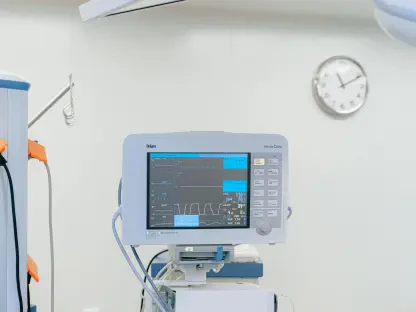Imagine a world where health isn’t just checked during sporadic doctor visits, but monitored continuously through the very devices carried every day, like a smartwatch or smartphone, offering a window into physical and mental well-being without invasive procedures. Digital biomarkers, defined as objective and measurable data captured by such digital tools, are making this a tangible reality, fundamentally altering the healthcare landscape. They enable real-time insights into conditions ranging from heart irregularities to early signs of chronic illnesses, fostering a shift toward proactive and personalized medical care. The market for these innovative tools is surging, with projections estimating a robust 20% compound annual growth rate (CAGR) through 2030, driven by escalating chronic disease rates and a societal tilt toward health awareness. This growth signals a pressing need for cutting-edge solutions that digital biomarkers are uniquely positioned to meet. Delving deeper, it becomes clear that their impact spans far beyond individual health tracking, influencing clinical research and healthcare delivery on a global scale.
Understanding the Core of Digital Biomarkers
Digital biomarkers represent a groundbreaking approach to health monitoring, capturing quantifiable data through everyday devices such as smartphones, wearables, and sensors, which track metrics like sleep quality, activity levels, and even behavioral patterns. Distinct from traditional biomarkers that often require lab-based or invasive testing, these digital alternatives provide a seamless, non-intrusive way to gather health information continuously. Their significance lies in managing a spectrum of conditions, including diabetes, cardiovascular diseases, and mental health challenges, by facilitating early detection and customized treatment plans. Enhanced by technologies like artificial intelligence (AI) and machine learning, digital biomarkers are proving indispensable in tailoring medical interventions to individual needs and supporting remote patient oversight, thus redefining how healthcare providers approach diagnosis and care management in diverse settings.
The importance of digital biomarkers extends into their ability to bridge gaps in conventional healthcare systems, particularly in areas where access to regular medical evaluations is limited. By offering real-time data collection outside clinical environments, these tools empower both patients and professionals with actionable insights, fostering a more responsive and adaptive health management framework. Their integration into personalized medicine is particularly noteworthy, as they enable precise monitoring of disease progression and treatment efficacy on an individual level. Moreover, their role in clinical research is evolving, providing researchers with vast datasets to analyze health trends and outcomes more effectively. As technology continues to advance, the precision and scope of digital biomarkers are expected to expand, further solidifying their position as a vital component in the ongoing transformation of medical practice and patient care strategies across the globe.
Forces Propelling the Rise of Digital Biomarkers
Several critical dynamics are accelerating the adoption and growth of digital biomarkers within the healthcare sector, reflecting broader societal and technological shifts. A primary driver is the escalating prevalence of chronic diseases worldwide, which necessitates constant health monitoring solutions that digital tools can deliver with ease and efficiency. Concurrently, the widespread presence of smart devices, such as fitness trackers and smartwatches, has enabled individuals to actively engage with their health data in real-time, mirroring a cultural move toward wellness and tech-savvy lifestyles. This consumer-driven demand is complemented by the healthcare industry’s pivot to preventive and personalized care models, where digital biomarkers provide critical insights for early intervention and tailored health strategies, supported by sophisticated AI-driven data analytics that enhance clinical decision-making processes.
Another significant force behind this boom is the pharmaceutical industry’s increasing reliance on digital biomarkers to streamline clinical trials, making them more cost-effective and less dependent on traditional, resource-heavy methods. By facilitating real-time data capture, these tools reduce the logistical burdens of trial management, allowing for broader participant inclusion and faster result generation. Additionally, advancements in data processing technologies are amplifying the capability to interpret complex health information, thus improving the accuracy of medical assessments and interventions. This convergence of need and innovation is creating fertile ground for digital biomarkers to flourish, as stakeholders across the healthcare spectrum recognize their potential to transform patient outcomes and operational efficiencies. The momentum shows no sign of slowing, as ongoing technological developments promise to further integrate these tools into mainstream medical practice.
Transformative Trends Redefining Healthcare
A notable trend reshaping healthcare through digital biomarkers is the explosive growth of wearable technology, which empowers individuals to take control of their health monitoring while equipping medical professionals with continuous data streams for proactive care delivery. Devices like smartwatches and fitness bands, integrated with cloud-based platforms and AI analytics, convert raw metrics into meaningful health insights, enhancing capabilities for remote patient monitoring. This trend not only supports individual health management but also enables healthcare systems to shift focus from reactive treatments to preventive measures, addressing potential issues before they escalate. The accessibility of such technology is fostering broader acceptance of digital health solutions, aligning with a growing consensus on the value of consumer-centric tools in modern medical ecosystems.
Equally transformative is the emergence of decentralized clinical trials, a model leveraging digital biomarkers to gather patient data remotely, thereby reducing the need for physical site visits and associated costs. This approach enhances trial accessibility, improving participant recruitment and retention while making research more inclusive across diverse geographies. Regulatory bodies are increasingly validating digital endpoints, signaling a progressive shift toward patient-focused research frameworks. Digital tools, including mobile applications and sensors, play a pivotal role in ensuring seamless data collection, thus streamlining trial processes for pharmaceutical entities. This trend underscores a fundamental change in how clinical research is conducted, prioritizing flexibility and patient convenience, and positioning digital biomarkers as essential enablers in the evolution of innovative, efficient, and inclusive medical studies.
Broad Applications and Worldwide Impact
The versatility of digital biomarkers is evident in their wide-ranging applications, touching nearly every aspect of healthcare from disease diagnosis and ongoing management to drug development and predictive risk assessments. They address an array of health conditions, spanning neurological disorders, cardiovascular issues, respiratory ailments, and mental health challenges, serving a diverse group of end users including pharmaceutical firms, healthcare providers, and insurance payers. Their adaptability ensures that whether through wearable gadgets, mobile software, or standalone sensors, digital biomarkers are becoming integral to health monitoring and intervention strategies. This broad applicability highlights their potential to customize healthcare solutions across various therapeutic areas, meeting specific needs with precision and fostering a more responsive medical environment.
Geographically, the influence of digital biomarkers is truly global, impacting regions like North America, Europe, Asia Pacific, and extending into Latin America and the Middle East & Africa, reflecting their universal relevance and scalability. This worldwide reach underscores how these tools are not confined to specific demographics or economic conditions but are adaptable to diverse healthcare systems and cultural contexts. Their integration into different markets is facilitated by evolving technological infrastructures and growing acceptance of digital health solutions among varied populations. As digital biomarkers continue to penetrate these regions, they contribute to a more interconnected and data-driven global health landscape, enabling cross-border collaboration and knowledge sharing. This expansive presence signals a future where health monitoring and care delivery are increasingly standardized yet personalized, driven by the ubiquitous adoption of digital innovations.
Reflecting on a Digital Health Milestone
Looking back, the journey of digital biomarkers marked a significant turning point in healthcare, as their adoption fundamentally altered how health was monitored and managed across populations. Their ability to provide real-time, non-invasive insights through everyday devices reshaped patient care, making it more personalized and preventive, while their role in decentralizing clinical trials redefined research efficiency and inclusivity. With a market trajectory that saw a consistent 20% CAGR leading up to 2030, digital biomarkers proved their worth as indispensable tools in addressing global health challenges. Moving forward, the focus should shift to overcoming barriers like data privacy concerns and regulatory complexities by fostering robust frameworks that ensure security and compliance. Stakeholders must also prioritize accessibility, ensuring these technologies reach underserved regions, thus amplifying their impact. As innovation continues, collaboration between tech developers, healthcare providers, and policymakers will be key to sustaining this momentum and fully realizing the potential of digital health solutions.









